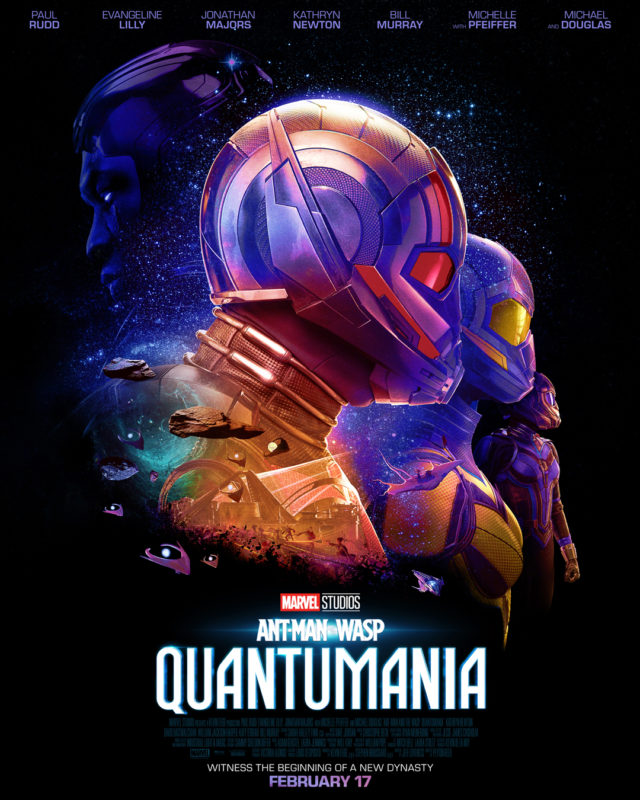
14 Feb Ant-Man and The Wasp: Quantumania Review
Ant-Man and The Wasp: Quantumania
dir. Peyton Reed, starring Paul Rudd, Evangeline Lilly, Michelle Pfeiffer, Kathryn Newton, Jonathan Majors, et al
Everything is going great in Scott Lang’s world. He’s a successful author, he has his relationship with Hope van Dyne, and his bond with his daughter couldn’t be stonger. All that changes when the three of them, along with Janet Van Dyne and Hank Pym, are transported to the Quantum Realm, taking them on an adventure that has them facing off against their most dangerous opponet yet.
With Quantumania, Peyton Reed is the second MCU director to take a character through a full trilogy. With Ant-Man, Reed and his team crafted a simple heist film, a construct that worked famously within the confined of the shared universe. Ant-Man and The Wasp expanded the scope of Scott’s world, giving viewers a Ferris Bueller-style adventure comedy focused on rescuing Janet van Dyne from the Quantum Realm. With Quantumania, the smaller, more character focused storytelling has largely been traded in for a wide ranging, consequence-heavy epic that feels out of step with its previous outings. Gone are the good natured antics and warmth of the X-Con gang, who fail to appear in the movie, replaced instead by an underdeveloped band of freedom fighters. The tone of the Ant-Man franchise, the foolish absurdity that Paul Rudd has made his bread and butter over the decades, quickly dissipates in the film’s opening act, replaced by jokes that land at an inconsistent rate and cameos that ultimately amount to nothing.
Written by Rick and Morty writer Jeff Loveness, the overall issue with Quantumania lies in the story. If the purpose of the story is to introduce Kang the Conqueror as the next overarching villain of the MCU, the ball was certainly fumbled here. While Kang is undeniably a threat, he doesn’t feel like an Avengers-level threat during or after the events of this film. While the post credit scenes do a little to push the narrative, the movie itself fails at establishing Kang as a worthy menace, never fully revealing his overall goal outside of escaping the Quantum Realm. The Multiverse Saga was teased and set up throughout Phase 4, doing double duty as something of a dénouement of the Infinity Saga, but after the events of Spider-Man: No Way Home, Loki, and Doctor Strange in the Multiverse of Madness, audiences were poised to delve fully into the multiverse and Kang’s tyrannical reign upon it. Unfortunately, no such thing happens in Quantumania, continuing to leave audiences in the dark about what’s coming or anyone’s role in it (except Sylvie, her role was very clearly defined). It’s this lack of clear definition that may leave some lukewarm on the run up to 2025’s Kang Dynasty, a movie that Loveness is also the writer of.
Starring Paul Rudd, Quantumania takes the time to explore the relationship between Scott Lang and his daughter Cassie. The overall theme and strongest throughline of the trilogy has been Scott’s love for his daughter and this movie continues it; Rudd and Kathryn Newton have excellent chemistry together. Typically the happy-go-lucky Avenger, Rudd is able to expand a bit thanks the more dramatic elements of the film. These scenes Rudd, an actor proven that he can be just as good dramatically as he can comedically, handles with ease.
The story’s decision to fixate on Scott and Cassie’s relationship comes at the detriment of almost every other character on screen, save Kang. Hank Pym, once again played beautifully by the seemingly perennially cantankerous Michael Douglas, has woefully little to do in this film, relegated to the background throughout the majority of the runtime. The same can be said for Evangeline Lilly as The Wasp, hanging back and serving little purpose other than to ask the questions the audience is already thinking. While the relationship between Lang and Hope van Dyne was fractured between the first two Ant-Man movies, time has managed to heal all wounds between the two here. Rudd and Lilly are always great together, with Lilly’s no-nonsense nature counterbalancing Rudd’s goofiness perfectly. With Quantumania, however, audiences don’t get much interaction between the characters. Lilly is fine in the role, but sadly, is given little to do outside of one major scene.
Michelle Pfiffer, bascially teased in the last minutes of Ant-Man and The Wasp, comes to forefront here in Quantumania as the audience’s guide through the strange world. Pfiffer carries weight in the movie as Janet van Dyne navigates the heroes through the terrain while providing the necessary back story on Kang. Her agency in the movie cannot be denied, and while she takes a step back later in the film as Kang and Lang square off, she dominates the first half.
Jonathan Majors is Kang. A complete 180 turnaround from the character he played in the last episode of Loki, this iteration of the character is as ruthless as he is cunning. Physically, Majors takes up space on the screen, and while he’s roughly the same height as Rudd, it’s Majors’ presence that makes him seem larger than he is. The first of two antagonistic roles this year, Quantumania shows that while he’s up to the task, the script and story don’t rise to his skillset. Majors is fascinating on the screen; Kang the Conqueror doesn’t fully reach the expectations levied upon him by producer Kevin Feige.
The most disappointing element of the film is M.O.D.O.K. While impressive visually, and voice acted well enough by Ant-Man returnee Corey Stoll, the arc that began for Darren Cross in the first movie sees a limp and unsatisfying conclusion here. Sprinkled throughout the film generously, a lot of the jokes designed for or surrounding him fall flat in way that can’t help but be reminiscent of Thor: Love and Thunder.
Peyton Reed’s ambition has to be admired. With some of the best visual effects since the MCU has entered the Multiverse Saga, Quantumania is a sight to behold. From the moment the characters enter the Quantum Realm, the background of almost any scene seems to be something pulled from Reed’s fever dreams. While that doesn’t always work in the film’s favor (the actors rarely interact with the background, at times leaving a clear visual impression of two people standing in front of a screen), the praised must be heaped on the visual effects team. The trip to the Quantum Realm, the Mos Eisley cantina-esque scene, and the bevy of creatures found inhabiting the land have many comparing the movie to Star Wars, and rightfully so. It can’t go overlooked that Reed unabashedly loves the Fantastic Four and actively worked on a film treatment long ago; there’s scenes and ideas throughout that nod to his love of wacky space adventures. While the film’s pacing is problematic, especially in its shaky first act, once Kang is finally introduced, the storytelling settles into its pace. Once established, the second act shines as the film’s highlight, giving the story the feel of Mad Max Beyond Thunderdome, painting parts of the Quantum Realm as a desolate wasteland completely unlike what was shown near the end of Ant-Man and The Wasp. The third act, the weakest of the trilogy, enters absurd territory as Scott fights to stop Kang from enacting his nefarious scheme.
Overall, Quantumania, while still entertaining at times, lacks the magic of its predecessors. The original spirit of the characters, the charm of Paul Rudd, and the low stakes of the Ant-Man franchise are absent, leaving viewers with a bleaker tone and a lack of goofy charisma they’ve come to expect. While Peyton Reed is still taking ambitious swings, a number of ideas don’t fully connect, leaving the audience with a story that doesn’t fully lives up to its potential. Rudd continues to be delightful, Jonathan Majors is appropriately menacing, and Kathryn Newton is a great addition, making the outcome of this project all the more baffling. Worth seeing on the biggest possible screen thanks to some of the great visual effects, Quantumania may have some viewers continuing to question the overall quality of the post-Endgame world we live in. Ant-Man and the Wasp: Quantumania hits theaters February 17th.
Review by Darryl Mansel


No Comments